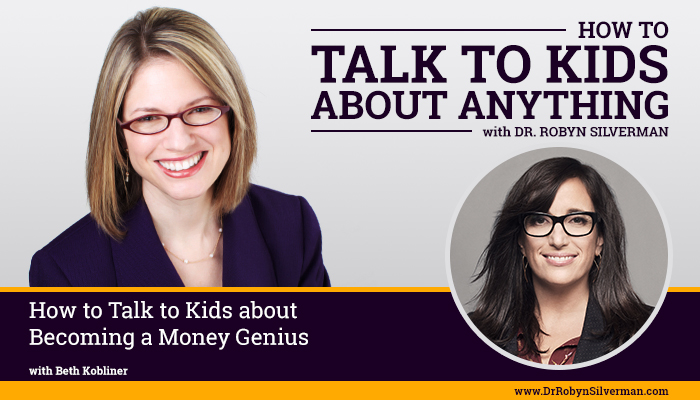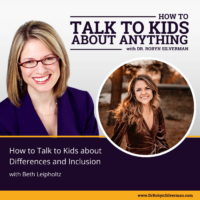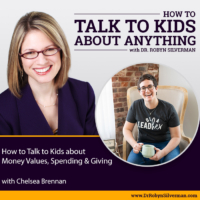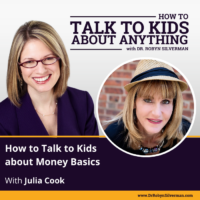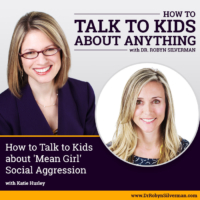Podcast: Play in new window | Download
Subscribe: Apple Podcasts | RSS | More
How to Talk to Kids about Becoming a Money Genius
Beth Kobliner is one of the nation’s leading authorities on personal finance for young people, and the author of the New York Times bestsellers Make Your Kid a Money Genius (Even If You’re Not) and Get a Financial Life: Personal Finance In Your Twenties and Thirties. A former staff writer at Money magazine, she has contributed to the New York Times and the Wall Street Journal, and has appeared on CNN, MSNBC, NPR, and Sesame Street. She also served on President Obama’s Advisory Council on Financial Capability for Young Americans. You can learn more about Beth in the notes of this podcast on DrRobynSilverman.com and also on Beth’s website at BethKobliner.com
Special Guest: Beth Kobliner
Do you want to make your kid a money genius (even if you’re not)? Well then you are in luck today! We live in a time when stakes are high—many parents worry that their kids will NOT be more financially successful than they were- which is a big change from previous generations that always seemed to believe that the next generation would be better off than they were. Given that we hear about lots of kids who often wind up with high student loans, low paying jobs and not enough money to go out on their own after college, is there something we can do NOW to help our kids ore knowledgeable about how to best handle money? Turns out, yes there is. And there is work to be done– many kids and young adults don’t know what they need to know about how to save, spend, invest and ultimately use money in responsible ways. We’ve talked about money with in a past episode with money expert, Neale Godfrey, and today we are going to get into some different money questions that help us, age by age, know what to do to help our kids become money geniuses, what mistakes to avoid and how we talk to kids about all if this- and we have the privilege to have money genius herself, Beth Kobliner on the show!
The podcast provides:
- Tips: All about allowance, chores, money choices, investing and saving- and doing it by age by age.
- Scripts: What to say to a child when they want to spend the money they’ve been promising to save for a goal.
- Scripts: What to say when your child comes into some money from a big party or a gift from someone- so that they use it, save it or even give a portion of it to charity
Important Messages:
- Allowance: It’s not the holy grail. Some studies say that kids become more responsible and others say that it can make children more entitled. So it’s more important, no matter what you do, to ensure that when you chip in money, children know what it’s for.
- Give allowance in cash- not in apps. You want to talk to kids about money as you are giving.
- Don’t tie allowance to chores
- If you would pay another person for this job, you can pay your child for doing that job (i.e. weeding, shoveling snow, babysitting, organizing photos).
- Teach young kids about money and value, needs vs wants, comparative shopping, earning money by doing jobs. Use the “3 jar” idea.
- Talk to kids about delayed gratification- saving money for what they really want.
- A study out of the University of Cambridge says that money habits are already set by age 7.
- With elementary-age kids- talk about advertising and comparative shopping. Open bank accounts. Set clear goals about shopping on line.
- When kids are able to wait, those kids had higher SAT scores, better relationships, lower BMI and better about handling money.
- Middle schoolers: Try some money plans. Talk about compound interest. Investments. Explain credit cards.
- College kids report that if their parents fought about money, they were more likely to have debt themselves. Don’t fight about money in front of your kids.
- Part time jobs can be complicated for high school students- talk about this and make sure it’s the right number of hours.
- Talk about college planning with your child- you want one that will be great for the kids but also one that is affordable for you.
- Open a Roth IRA with $500 for 5 years and let it sit there- and by the time they stop working they will have $100,000.
- Roth IRA earnings often won’t negatively impact your child’s chance at getting financial aid for college.
- Don’t give in at the check out line of the store! When we don’t give in, these children do better with money. It helps with self control.
- Parents- let your children know you are saving money for college.
- Try saving for a shared family goal.
- Commiserate and explain.
Notable Quotables:
- “Kids who start at young ages with chores and don’t get paid for them are shown to hit some financial milestones more easily that those kids who get paid for chores.”
- “Don’t link allowance to those everyday chores that you expect them to do.”
- “The most important thing about giving money to your child is being consistent with money and having conversations about money. Whether people have a lot of money or a little money, these conversations are very tough to have.
- “We would never think of not having conversations with kids, as they get older, about sex or drugs. But when it comes to money, people are still hesitant. It’s still taboo. How are we spending our money? What do I wish I had? How am I saving up? Once we get in that place with kids where we having these conversations, that’s when our kids become money geniuses.”
- “Open up a bank account with your kids. Go to the bank…it’s an experience that makes it more concrete for children to walk into the bank with their parents, get statements, and see that they’ll get a little bit of extra money- a few pennies- more than what you had when you put the money in- and that’s interest! It’ll grow faster than if we keep it at home and leave it in our drawer.”
- “Tell your middle schoolers, if you put away only 10 dollars a month, and you did that starting at age 10 and earned a pretty average rate of return, by the time you stop working, you’ll easily have a $100,000.”
- Explain to your kids; “A credit card is a loan. You have to pay it off or you pay a lot more money. If you want an Ipad and you put it on a credit card and only make those minimum monthly payments, it will take you many years and many hundreds of dollars to pay it off and that’s a waste of money!”
- “Just like we tell kids at young ages, ‘smoking is bad for you,’ we have to talk about credit cards and how people can really ruin their lives if they start buying things that they can’t really afford.”
- “You can tell your kids; people who graduate from college out-earn those who graduate from high school by about a million dollars over their lifetime. College is still a good investment.”
- “Open up a Roth IRA with your kid. If, during the summer, they earn $500 by working and they do this for 5 years, by the time they stop working they will have $100,000!”
- “I love the study that says that parents who let their children know that they are saving money for college have kids who are more likely to go to college regardless of what is in those bank accounts. It shows your kids that it’s something you value and an expectation.”
- “When we are teaching our children about money, we are also teaching ourselves about what really is important and helping ourselves remember; ‘yeah, we really are thinking of long-term goals.’”
- “Don’t spend money you don’t have.”

